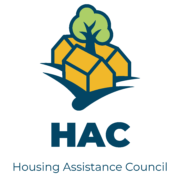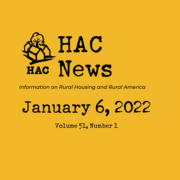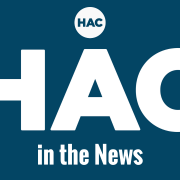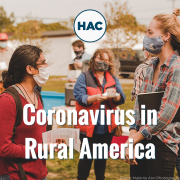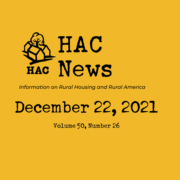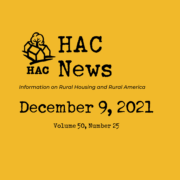Vol. 50, No. 25
TOP STORIES
Federal funding extended to February 18.
Hours before a temporary spending measure was set to expire on December 3, Congress passed and President Biden signed another continuing resolution that will fund the government through February 18, 2022. The new CR holds most government programs, including housing programs at USDA and HUD, at their fiscal 2021 funding levels; fiscal year 2022 began on October 1, 2021. FY22 appropriations bills proposing increased resources for some USDA and HUD housing programs passed the House in July and have been introduced in the Senate.
HAC holds National Rural Housing Conference, sessions now available online.
Rev. Dr. William Barber issued an inspiring call to action on Poverty and Equity in Rural America at HAC’s Virtual 2021 National Rural Housing Conference, held November 30-December 3. His address is available on HAC’s YouTube channel along with other plenary sessions featuring USDA Secretary Tom Vilsack, HUD Secretary Marcia Fudge, Rep. James Clyburn (D-S.C.), Rep. Bennie Thompson (D-Miss.), Rep. Maxine Waters (D-Calif.), and others. The more than 550 registrants from 44 states, DC, and the Virgin Islands can access workshop recordings on the conference app. HAC thanks our many sponsors, scholarship contributors, and partners for helping to make the event possible.
RuralSTAT
Between 2019 and 2020 the number of home purchase mortgage loans in rural America increased by 13.7% – a rate higher than in suburban or urban areas for the same time period. Source: Housing Assistance Council Tabulations of 2019 and 2020 FFIEC Home Mortgage Disclosure Act data.
OPPORTUNITIES
USDA offers support for farmworkers and food workers.
The new Farm and Food Worker Relief Grant Program will make grants to state agencies, tribal entities, and nonprofits with experience in providing support or relief services. Grant recipients will then distribute relief payments to frontline farmworkers, meatpacking, and grocery workers who incurred expenses preparing for, preventing exposure to, and responding to the coronavirus pandemic. Applications are due February 8. For more information, contact USDA staff.
Indian housing competitive grants deadline extended.
Tribes and tribally designated housing entities now have until January 4 to apply for the Indian Housing Block Grant Competitive Grant Program. HUD has posted updated Frequently Asked Questions. For more information, contact HUD staff.
HAC seeks Loan Processor Associate, Housing Specialist, and Community Facilities Housing Specialist.
- The Loan Processor Associate is an entry-level position and will assist in managing HAC’s portfolio of loans made to entities engaged in affordable housing activities throughout the rural U.S. This position is eligible for telecommuting.
- The Housing Specialist is primarily based in either the Southwest or Western states (within two hours of a major airport) and works with local partner organizations to identify financial resources and funding opportunities to support the preservation and development of affordable housing and community and economic development strategies specifically throughout expanses of Southwest and/or Western rural America. This position is remote location eligible.
- The Community Facilities Housing Specialist identifies and engages community stakeholders and provides direct technical assistance to rural organizations that are developing facilities such as parks, community centers, public libraries and childcare centers. This is a two-year position and is eligible for telecommuting.
REGULATIONS AND FEDERAL AGENCIES
USDA continues temporary authorization for appraisals.
For single-family direct loans, USDA will accept appraisals obtained by self-help grantees, certified loan application packagers, approved intermediaries, and leveraged or other participating lenders. This temporary authorization is effective through September 30, 2022.
Toolkit aims to help practitioners comply with federal lead rules.
HUD’s Office of Lead Hazard Control and Healthy Homes has developed a Lead Safe Housing Rule Toolkit with sample forms, checklists, and flowcharts to aid compliance with HUD’s rules on lead safe housing for units both with and without federal assistance.
Regulations revised for oneRD Guarantee Loan Program.
Based on comments and experience since a final rule was adopted in 2020, USDA has revised its regulations for oneRD, which applies to the Community Facilities, Water and Waste Disposal, Business and Industry, and Rural Energy for America guarantee programs. The changes are effective immediately but comments can be submitted until February 8. For more information, contact Thomas P. Dickson, USDA, 202-690-4492.
Change proposed for H-2A farmworker wages.
The Department of Labor is proposing to change the way wages are determined for many farmworkers with temporary H-2A visas. Comments are due January 31. For more information, contact Brian Pasternak, DOL, 202-693-8200.
Worker heat standards comment deadline extended.
OSHA has extended the deadline for responses to its request for information about protecting outdoor and indoor workers from hazardous heat. Comments are now due January 26. For more information, contact Andrew Levinson, OSHA, 202-693-1950.
PUBLICATIONS AND MEDIA
State and local use of Emergency Rental Assistance funds remains uneven.
Treasury Department data show that in October some states and localities began using the second round of Emergency Rental Assistance funds, while efforts to use the first round continue. Treasury estimates at least 80% of ERA 1 funds will be spent or obligated by the end of 2021. A National Low Income Housing Coalition analysis shows that states – which provide this rental aid for many rural areas – spent 48% of their ERA 1 funds by October 31, while localities spent 68%. Treasury has not yet announced how much ERA 1 funding it will reallocate, or what jurisdictions will gain or lose dollars.
Legal aid attorneys report eviction law violations continue.
A National Housing Law Project survey of legal aid and civil rights attorneys found that despite the availability of Emergency Rental Assistance and other aid, eviction filings rose, even for federally subsidized tenants, after the federal eviction moratorium ended on August 26. Survey respondents also saw more landlords lying in court to evict tenants; more illegal evictions, lockouts, and other harassment of tenants; evictions even after landlords collected rental assistance funds; and judges ignoring or inconsistently applying federal and state law. NHLP’s survey report includes recommendations to resolve these violations.
“Lost local news” includes stories on housing, prairie conservation, other rural topics.
The Lost Local News Issue of the Washington Post Magazine provides stories from local journalists living and working in news deserts, many of them in rural places and small towns. A Long-Deferred Hope for Better Housing, a photo essay, shows part of the process of remodeling the home of a low-income resident of Leflore County, Mississippi. (The author and photographer, Rory Doyle, also contributed to HAC’s There is More Work to Be Done exhibition.) How to Save the Prairie, Acre by Acre tells the story of Bob and Lorna Harder, who have preserved a portion of their farm in Kansas for Great Plains native plant species.
Article highlights rural use of housing tax credits.
Creating Affordable Housing in Rural America, an article in Affordable Housing Finance magazine, describes how developers around the country use Low Income Housing Tax Credits to address homelessness and the need for rental housing in rural America.
New docuseries explores perceptions of rural life.
Rural By Choice is filmed in Otter Tail County in central Minnesota. It shares stories from residents about “diversity, the rural vs. urban divide, and why people choose to live in rural areas.”
Almost all states criminalize homelessness.
A new study identifies laws in 48 states that prohibit or restrict conduct of people experiencing homelessness such as sleeping in public or in vehicles. Housing Not Handcuffs 2021, a National Homelessness Law Center study of state laws, supplements 2019 research on municipal laws. The law center notes that local laws and variations in enforcement can lead to penalties for activities even when they are not restricted by a state-level statute.
Need capital for your affordable housing project?
HAC’s loan fund provides low interest rate loans to support single- and multifamily affordable housing projects for low-income rural residents throughout the U.S. and territories. Capital is available for all types of affordable and mixed-income housing projects, including preservation, new development, farmworker, senior and veteran housing. HAC loan funds can be used for pre-development, site acquisition, site development, construction/rehabilitation and permanent financing. Contact HAC’s loan fund staff at hacloanfund@ruralhome.org, 202-842-8600.
Please note: HAC is not able to offer loans to individuals or families. Borrowers must be nonprofit or for-profit organizations or government entities (including tribes).


